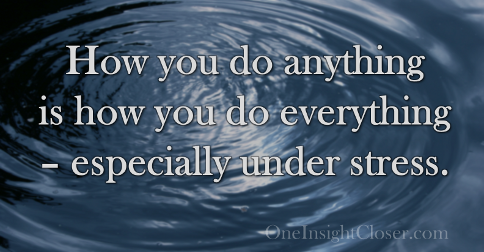 Note: I’m fine and well taken care of. Details of my “episodes” are at the end of the post (I share because I know you might be curious, not because I’m looking for advice).
Note: I’m fine and well taken care of. Details of my “episodes” are at the end of the post (I share because I know you might be curious, not because I’m looking for advice).
I had an episode at the gym last month – a bad one by my standards (I don’t know what it is by other’s). It was a bathroom trip, juice box, another bathroom trip, lay down on the floor and have an ice pack episode.
And then I felt fine for the rest of the day.
I haven’t had an episode like that for a long time – over a year? I can usually feel them coming.
As it was happening, part of me noticed the pronounced difference in how I was handling it this time as opposed to the last time I had a fairly bad episode.
Last time I just wanted to sit in the bathroom – I didn’t feel well and thought I was going to be sick.
And I wanted someone to just take care of me, to fix it and make it all better.
When Karen (my personal trainer) came to check on me I really appreciated it, and I wasn’t sure that leaving the bathroom and having a juice box was really what I needed, but I trusted her and followed her advice.
And I felt better.
In my business at the time, it was similar – I wanted someone to give me the exact steps to follow and just make it all better. Heck, I wanted someone to just tell me what direction to go!
At the same time, I wasn’t sure that the direction or steps anyone was giving me were really going to work, but I did them anyway.
That process took longer than the juice box…
Fast forward to last month.
I’m feeling sick and like I should just head to the bathroom. I know a juice box will help, but I need to go to the bathroom – so I go.
And as I sit there feeling sick, I also know that I need to get up and have a juice box. I want to get up, even though I don’t feel like it.
So I go.
Under the watchful and caring eyes of Karen and Donna (the workout room attendant) – I have a juice box.
I still feel ill, but also a slight bit better.
I have to go to the bathroom again. I try to be quick because I know that staying in there too long isn’t what I need AND because Karen and Donna are worrying about me.
As I’m washing my hands, Karen comes in to check on me – making sure I haven’t passed out or something – I’m grateful.
I head back out and sit down.
Donna asks if I want to lie down on a weight bench. I opt instead for a mat on the floor – something I won’t potentially fall off of.
Karen gets a couple of ice packs, no longer asking if I want one – just knowing it’s what I need, even when I don’t. I take them, one for my neck and one for my forehead.
Now I am starting to feel better – I start joking with Karen and Donna.
Karen says the color has returned to my face.
I move back to the chair and sit for another ten minutes, just to make sure I’m okay to drive home and Karen starts her own workout.
The episode passed in under 15 minutes and I’m heading out the door at about the 25 minute mark.
In my business, things have also changed a lot.
I’m no longer looking for anyone to take my hand and tell me the direction I should be heading.
I chose my own direction and when I need or want help, I have trusted people (coaches and fellow entrepreneurs) to ask. And I modify what I learn to work for me and where I am.
I’m no longer looking for a savior or magic pill from the outside (well, we all have bad days).
Instead I’m looking and finding support and resources to help me take the needed/wanted steps and occasionally suggest something else that I’m blind to or simply don’t know about.
How we do anything is how we do everything. I’d add – especially under stress.
I have two questions for you today, I’d love if you’d answer one or both of them in the comments below:
- How do you react under stress and how do you want to react?
- How have you grown in the past year or so?
Episode details: My personal trainer and I believe the episodes are caused by a sugar crash in my body. I have been tested and I’m not diabetic or hypoglycemic, but a juice box generally brings the color back to my face pretty dang quickly.
The episodes are brought on by lots of heavy cardio where my heart rate is elevated a bit higher than a normal workout. Generally, at around the 10-15 minute mark I can feel the telltale signs that an episode is coming and Karen will notice I’ve gone a bit pale. When that happens I sit down and generally have a juice box. Then my color returns and I feel fine.
These episodes are not a regular occurrence. The bad ones, as described above, happen maybe once a year. The less severe ones (when I notice it coming earlier) happen maybe 2-3 times a year.






